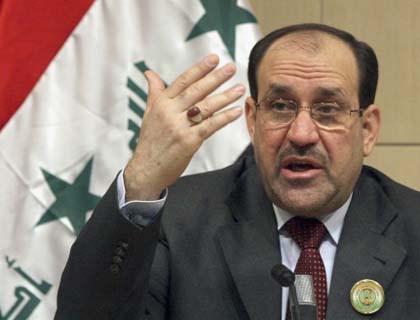BAGHDAD - Iraq's Prime Minister Nouri al-Maliki faces mounting pressure to form an inclusive government or step aside following the loss of large swaths of territory to Sunni militants, with both a top Shiite cleric and the White House strongly hinting he is in part to blame for the crisis.
The most respected voice for Iraq's Shiite majority on Friday joined calls for al-Maliki to reach out to the Kurdish and Sunni minorities a day after President Barack Obama challenged him to create a leadership representative of all Iraqis.
Grand Ayatollah Ali al-Sistani's thinly veiled reproach was the most influential to place blame on the Shiite prime minister for the nation's spiraling crisis, the most severe since U.S. troops withdrew at the end of 2011.
Over the past two weeks, Iraq has lost a big chunk of the north to the al-Qaida-inspired Sunni militants of the Islamic State of Iraq and the Levant, whose lightning offensive led to the capture of Mosul, the nation's second-largest city.
The gravity of the crisis has forced the usually reclusive al-Sistani, who normally stays above the political fray, to wade into politics, and his comments, delivered through a representative, could ultimately seal al-Maliki's fate.
Calling for a dialogue between the political coalitions that won seats in the April 30 parliamentary election, al-Sistani said it was imperative that they form "an effective government that enjoys broad national support, avoids past mistakes and opens new horizons toward a better future for all Iraqis."
Al-Sistani is deeply revered by Iraq's majority Shiites, and his critical words could force al-Maliki, who emerged from relative obscurity in 2006 to lead the country, to step down.
On Thursday, Obama stopped short of calling for al-Maliki to resign, but his carefully worded comments did all but that. "Only leaders that can govern with an inclusive agenda are going to be able to truly bring the Iraqi people together and help them through this crisis," Obama said.
The Iranian-born al-Sistani, believed to be 86, lives in the Shiite holy city of Najaf, south of Baghdad, where he rarely ventures out of his modest house and does not give media interviews. His call to arms last week prompted thousands of Shiites to volunteer to fight against the Sunni militants who have carved out a vast fiefdom astride the Iraq-Syria border.
For the past two years, al-Sistani has shunned politicians of all sects, but the latest crisis appears to have forced him to speak out.
His call to arms has given the fight against the Sunni insurgents the feel of a religious war, but his office in Najaf dismissed that charge, saying the top cleric was addressing all Iraqis.
Al-Maliki's State of Law bloc won the most seats in the April vote, but his hopes to retain his job are in doubt with rivals challenging him from within the broader Shiite alliance. In order to govern, his bloc must first form a majority coalition in the new 328-seat legislature, which must meet by June 30.
If al-Maliki were to relinquish his post now, according to the constitution the president, Jalal Talabani, a Kurd, would assume the job until a new prime minister is elected. But the ailing Talabani has been in Germany for treatment since 2012, so his deputy, Khudeir al-Khuzaie, a Shiite, would step in for him.
Al-Maliki's Shiite-led government has long been accused of discriminating against Iraq's Sunni and Kurdish populations. But it is his perceived marginalization of the once-dominant Sunnis that has sparked violence reminiscent of Iraq's darkest years of sectarian fighting in 2006 and 2007.
Shiite politicians familiar with the secretive efforts to remove al-Maliki said two names mentioned as replacements are former vice president Adel Abdul-Mahdi, a Shiite and French-educated economist, and Ayad Allawi, a secular Shiite who served as Iraq's first prime minister after Saddam Hussein's ouster. Others include Ahmad Chalabi, a one-time Washington favorite to lead Iraq, and Bayan Jabr, another Shiite who served as finance and interior minister under al-Maliki.
Nearly three years after he heralded the end of America's war in Iraq, Obama announced Thursday he was deploying up to 300 military advisers to help quell the insurgency. They join some 275 troops in and around Iraq to provide security and support for the U.S. Embassy in Baghdad and other American interests.
But the U.S. leader was adamant that U.S. troops would not be returning to combat.
Obama has held off approving the airstrikes sought by the Iraqi government, though he says he could still approve "targeted and precise" strikes if the situation required it and if U.S. intelligence gathering identified potential targets.
Manned and unmanned U.S. aircraft are now flying over Iraq 24 hours a day on intelligence missions, U.S. officials say. (AP)

